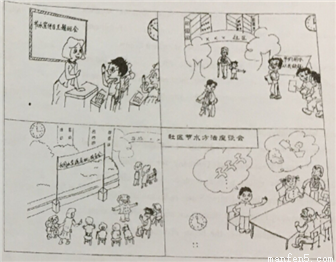题目内容
【来源】北京市中央民族大学附属中学2017届高三2月月考
假设你是某所中学的学生,鉴于世界很多地方水资源匮乏和世界水日的到来,你班开展了一系列节水宣传活动。请根据以下四幅图的先后顺序,以日记的形式记录当天的活动内容。
注意:词数不少于60。
提示词:宣传材料leaflets;危机crisis

March 6,2017 Monday Sunny
练习册系列答案
 轻松暑假总复习系列答案
轻松暑假总复习系列答案
相关题目
题目内容
【来源】北京市中央民族大学附属中学2017届高三2月月考
假设你是某所中学的学生,鉴于世界很多地方水资源匮乏和世界水日的到来,你班开展了一系列节水宣传活动。请根据以下四幅图的先后顺序,以日记的形式记录当天的活动内容。
注意:词数不少于60。
提示词:宣传材料leaflets;危机crisis

March 6,2017 Monday Sunny
 轻松暑假总复习系列答案
轻松暑假总复习系列答案